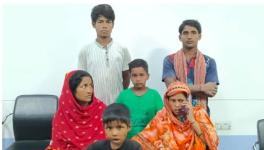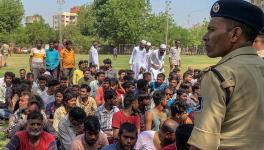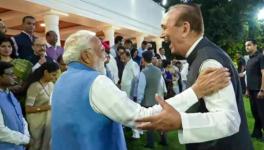Modi Govt Sleeps On, Migrant Workers’ Crisis Continues
Migrant workers and their distress have mostly fallen off the country’s mental map and news agenda. Seven months after the Covid-19-induced lockdown led to India’s largest internal migration since Independence, the plight of migrants is barely making headlines. The only exception is Bihar and that is because it is in the midst of an Assembly election. The distress of migrant workers is not only as urgent as it was in end-March, it is also deepening. There are now studies to show just how deep it runs for large swathes of Indians; it revolves around the basics of life—food and cash.
The studies should have stirred the Narendra Modi government into action, but the migrants’ plight is not a hot political issue. Besides, this is a government that unashamedly declared it had no data on how many migrants had died returning home.
Without relentless focus on the migrants’ distress by either the Opposition or the media, the government gets away lightly. By its own reckoning, there were at least 80 million migrants on May 14 when it announced free food grains for them. Estimates from the ground suggest well over 100 million would have reverse migrated between March and June. Fiscal packages announced so far have not reached the last migrant family on the line.
By July, nearly 66% of rural households fell short of cash for food, nearly 40% of the households had reduced their food intake, 41% of the returned migrants were not working and only 7% of migrants had found work in MG-MNREGA. A number of households had pawned assets to buy food items, and three out of every four had experienced fear and anxiety, according to a wide-ranging survey by the rapid Rural Community Response to Covid-19 or RCRC. Inaccessibility to food has been noted in the report, “Manufactured Maladies”, too—overall, about two-thirds of the migrants had not received cooked meals two months after the lockdown was announced, while around 81% had not got government ration till early July.
Crisis of food
The picture of distress in the RCRC report is stark, that of a silent humanitarian crisis unfolding beyond Mumbai, Delhi and Bangalore. Rural households, especially with returned migrants, lacked the most basic requirement of all—food. They were desperate enough to pawn assets, either jewellery or cattle, for loans to buy food. The worst drop in food intake was among Dalits among all social categories; among states, households in poll-bound Bihar saw the sharpest drop. Their precarious financial condition comes from this: 46% migrants had been earning only Rs.2,500 a month; a majority earned less than Rs.10,000 a month.
The RCRC, a coalition of civil society organisations, covered 80 districts in 11 states with a sample size of more than 17,000 households in July. More than a third of the households had at least one male member as migrant, almost half of the migrants were casual or manual labourers. The respondents in the states—Rajasthan, Gujarat, Maharashtra, Madhya Pradesh, Uttar Pradesh, Bihar, Jharkhand, Odisha, Assam and Meghalaya—were also disaggregated by caste, gender and income. Women formed 41% of the respondents, as did Scheduled Tribes. The report was released in September.
Within the first three months of returning home, 21% of migrants had taken loans from moneylenders for basic necessities, many of them at a usurious interest of 24% per annum. Nearly half of them did not have access to social security schemes and entitlements in host states. “The Round 2 report paints a very grim picture of distress,” remarked Nashik-based Ashwini Kulkarni, a working committee member of the RCRC, to NewsClick. “We ignore it at our own peril,” she says.
Only half the returned migrants got free ration three times or more, as the Modi government had promised. A majority of respondents—85%—knew about their entitlement to free ration but did not get it. Only 45% of women with Jan Dhan accounts received the promised Rs.500 three times since March—the worst was Odisha where nearly 90% had not received it—and 59% had not received the Rs.2,000 declared under Pradhan Mantri Krishi Sinchai Yojana (PMKSY). The government was not reaching them in fullest measure.
Their distress began when Prime Minister Narendra Modi announced the lockdown on March 24 with only four hours notice. It was one of the most stringent in the world, but the first fiscal package did not offer anything to migrants. “The footloose migrant workers, already living on the precipice of dignified existence, arguably bore the maximum brunt of this decision,” remarked “Manufactured Maladies: Lives and Livelihoods of Migrant Workers During Covid-19 Lockdown”.
The lockdown “caused much panic among migrant workers who lost their employment overnight with neither income nor food security,” noted the report, which was published in the Indian Journal of Labour Economics in October. It is authored by five scholars—Anindita Adhikari, Navmee Goregaonkar, Rajendran Narayanan, Nishant Panicker and Nithya Ramamoorthy—from Brown University and Azim Premji University among other institutions. They were also volunteers of Stranded Workers Action Network or SWAN, a relief effort that emerged spontaneously during the lockdown and has since documented experiences of 36,343 migrant workers trudging home.
State failure
It cites data to show that at least 972 migrant workers died not due to Covid-19 but “starvation, exhaustion and accidents during travel, lack of medical care, police brutality and suicides” during the lockdown which it condemns as “one of the darkest periods of State failure in India’s history”. The report is a comprehensive document of decisions and lapses, petitions filed in the Supreme Court including the one that asked for wages which was disposed of with the statement “if they are being provided food then why do they need money for meals?”, the establishment of the opaque PM-CARES fund, the confusing eight travel orders in a month, the mismanagement of trains and relief, and more. It is also a record of how informal civil society networks emerged to channel relief; SWAN says it transferred around Rs.6 million [60 lakh] directly to workers’ accounts for food and rations.
The majority of workers who reached out to SWAN were from Maharashtra and Karnataka—the highest numbers from Mumbai and Bangalore—followed by Delhi and Haryana. They were factory workers, construction workers, street vendors, drivers, domestic help, zari workers and so on, a significant majority of them informal or casual labourers, stated the report. There was a pattern to the distress calls—short-term inter-state migrants called in the initial days of lockdown, as time passed, distress calls from longer-term or intra-state migrants increased. This, the authors said, “indicates a widening net of vulnerability”.
Their findings on wages are especially striking—84% had not received wages from their employers during the lockdown, 12% had got partial payment. The contractor system made things worse; many contractors fled, a few paid nominal amounts, most forced workers to continue in jobs threatening to pull the plug on their food and accommodation. “Women workers were particularly impacted adversely during the lockdown,” the report noted.
The repercussion of the lockdown will be felt for years in which “destroyed livelihoods and food insecurity coupled with a crippled public health system is an urgent call for expansion and increase in public spending…The meagreness of relief package combined with the ‘legitimised’ opacity of PM-CARES fund further validates India’s fiscal response to the Covid crisis as one of the weakest in the world,” it pointed out.
There is a way out, but government is disinclined
It called for bolstering India’s “two pillars of relief response, NREGA and PDS”, universalising PDS for at least six months, and combining “food and cash instead of binaries of food or cash”. The Modi government should pay heed to the recommendations and stir itself to be more generous to migrants. It is a government that spent Rs.713.20 crore to promote itself through advertisements in newspapers, television and hoardings in 2019-20—nearly Rs two crores every day—according to RTI data now available.
The RCRC survey hammers home two more points: 78% of the migration to cities was “distress migration” driven by landlessness or lack of economic opportunities and seven out of every ten want to return to cities. It flags off mental health problems—75% respondents confessed they experienced fear and anxiety (among Dalits, 77%), nearly 40% had angry thoughts, one-third confessed to being heavily sleep deprived. On every parameter, women fared worse than men.
This silent humanitarian crisis is unfolding even as Prime Minister Modi amuses himself with peacocks and parrots and inaugurates a seaplane ride, when India’s ruling party is deeply engaged in election campaigning in Bihar—the state that saw a staggering 2.36 million migrants return by June—without offering them the relief they desperately need. Save a few honourable exceptions, neither the Opposition nor the media demands accountability from Modi on its handling of the migrants’ distress.
The author is a Mumbai-based journalist and columnist. She writes on politics, cities, media and gender and tweets @smrutibombay. The views are personal.
Get the latest reports & analysis with people's perspective on Protests, movements & deep analytical videos, discussions of the current affairs in your Telegram app. Subscribe to NewsClick's Telegram channel & get Real-Time updates on stories, as they get published on our website.
























